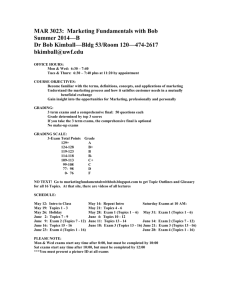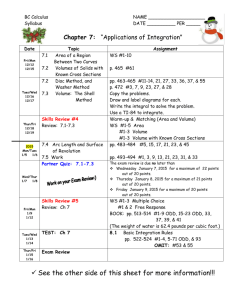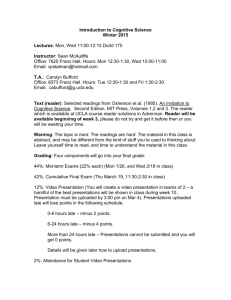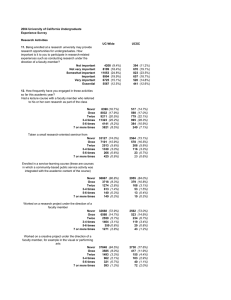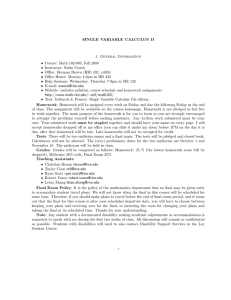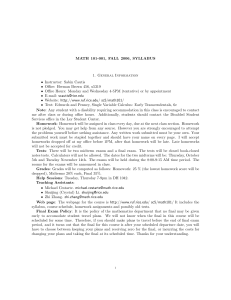Department of Physics
advertisement
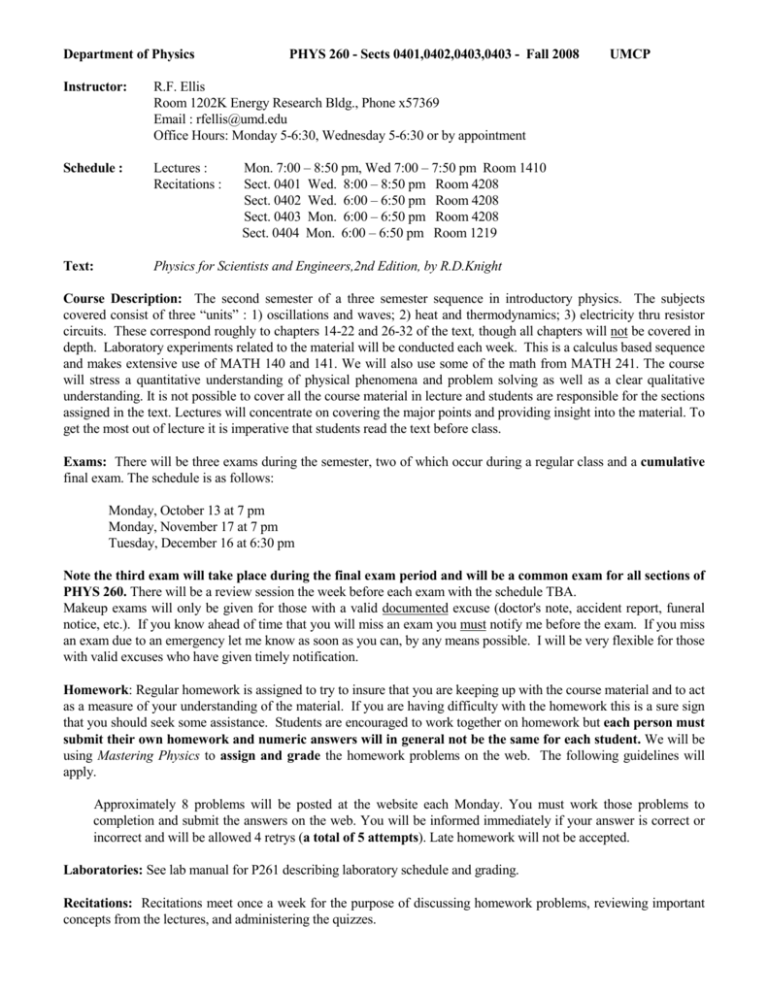
Department of Physics PHYS 260 - Sects 0401,0402,0403,0403 - Fall 2008 Instructor: R.F. Ellis Room 1202K Energy Research Bldg., Phone x57369 Email : rfellis@umd.edu Office Hours: Monday 5-6:30, Wednesday 5-6:30 or by appointment Schedule : Lectures : Recitations : Text: Physics for Scientists and Engineers,2nd Edition, by R.D.Knight UMCP Mon. 7:00 – 8:50 pm, Wed 7:00 – 7:50 pm Room 1410 Sect. 0401 Wed. 8:00 – 8:50 pm Room 4208 Sect. 0402 Wed. 6:00 – 6:50 pm Room 4208 Sect. 0403 Mon. 6:00 – 6:50 pm Room 4208 Sect. 0404 Mon. 6:00 – 6:50 pm Room 1219 Course Description: The second semester of a three semester sequence in introductory physics. The subjects covered consist of three “units” : 1) oscillations and waves; 2) heat and thermodynamics; 3) electricity thru resistor circuits. These correspond roughly to chapters 14-22 and 26-32 of the text, though all chapters will not be covered in depth. Laboratory experiments related to the material will be conducted each week. This is a calculus based sequence and makes extensive use of MATH 140 and 141. We will also use some of the math from MATH 241. The course will stress a quantitative understanding of physical phenomena and problem solving as well as a clear qualitative understanding. It is not possible to cover all the course material in lecture and students are responsible for the sections assigned in the text. Lectures will concentrate on covering the major points and providing insight into the material. To get the most out of lecture it is imperative that students read the text before class. Exams: There will be three exams during the semester, two of which occur during a regular class and a cumulative final exam. The schedule is as follows: Monday, October 13 at 7 pm Monday, November 17 at 7 pm Tuesday, December 16 at 6:30 pm Note the third exam will take place during the final exam period and will be a common exam for all sections of PHYS 260. There will be a review session the week before each exam with the schedule TBA. Makeup exams will only be given for those with a valid documented excuse (doctor's note, accident report, funeral notice, etc.). If you know ahead of time that you will miss an exam you must notify me before the exam. If you miss an exam due to an emergency let me know as soon as you can, by any means possible. I will be very flexible for those with valid excuses who have given timely notification. Homework: Regular homework is assigned to try to insure that you are keeping up with the course material and to act as a measure of your understanding of the material. If you are having difficulty with the homework this is a sure sign that you should seek some assistance. Students are encouraged to work together on homework but each person must submit their own homework and numeric answers will in general not be the same for each student. We will be using Mastering Physics to assign and grade the homework problems on the web. The following guidelines will apply. Approximately 8 problems will be posted at the website each Monday. You must work those problems to completion and submit the answers on the web. You will be informed immediately if your answer is correct or incorrect and will be allowed 4 retrys (a total of 5 attempts). Late homework will not be accepted. Laboratories: See lab manual for P261 describing laboratory schedule and grading. Recitations: Recitations meet once a week for the purpose of discussing homework problems, reviewing important concepts from the lectures, and administering the quizzes. Help: Help in understanding the concepts and solving problems can be obtained in a variety of ways. If you have a question or any difficulty, try to take advantage of all the available resources. These include: 1. discussions with me before or after class or in my office - please do not be shy about seeing me; 2. your recitation section, which is designed for just this activity; 3. The Slawsky Clinic. Bulletin Board: Please check every class day. I will communicate important information there or post solutions. I will also use email extensively. Grade: Your grade will be based on the following components: Two In Class Exams(equally weighted) Final Exam Mastering Physics Homework Laboratories(from P261) 40% 25% 10% 25% All grades are subject to "curving" and there is no set correspondence between numbers and letters. In general, a letter grade is only associated with the final course grade, but I can provide you an estimate of how I think you are doing, if requested. Active class participation will improve your chances of obtaining the best letter grade given your aggregate numerical total. You must complete P261 to get credit for P260. Topics and Chapters Subject Chapter UNIT 1 Oscillations Traveling Waves Superposition and Standing Waves Wave Optics 14 20 21 22 UNIT 2 Fluids Macroscopic Description of Matter Work,Heat, and the First Law of Thermo. Kinetic Theory, the Second Law of Thermo. Heat Engines and Refrigerators 15 16 17 18 19 UNIT 3 Electric Charges and Forces Electric Fields Gauss’s Law Electric Potential Potential and Field, Capacitors Current and Resistance Circuit Fundamentals 26 27 28 29 30 31 32
